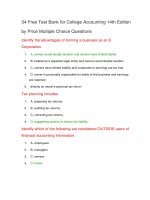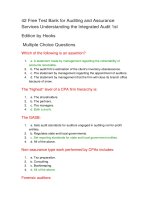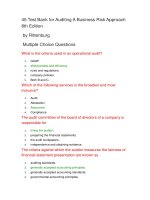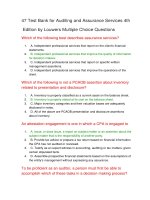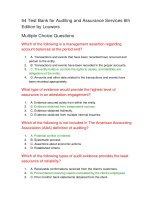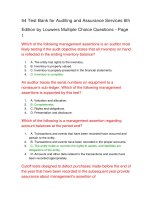Test bank for auditing 1st canadian edition
Bạn đang xem bản rút gọn của tài liệu. Xem và tải ngay bản đầy đủ của tài liệu tại đây (101.58 KB, 21 trang )
Test Bank for Auditing 1st Canadian Edition
True - False Questions
A negative expression of opinion is only given when there is a
disagreement with management and the auditor.
1.
True
2.
False
A reasonable level of assurance is the highest level of
assurance that an auditor can provide.
1.
True
2.
False
It is the auditor’s responsibility to prepare the financial
statements.
1.
True
2.
False
Only current investors (not potential investors) are considered
to be users of the financial statements.
1.
True
2.
False
A no assurance engagement is of little use as no assurance is
given to the client.
1.
True
2.
False
The expectation gap is caused by unrealistic user expectations
such as the auditor providing a moderate level of
assurance.
1.
True
2.
False
An operational audit is an example of a compliance audit.
1.
True
2.
False
The nature of audit procedures refers to the reliance on
evidence provided by the client and its management.
1.
True
2.
False
The most common types of assurance engagements are
financial statement audits, confirmation audits,
performance audits, comprehensive audits and assurance
on corporate social responsibility (CSR) disclosures.
1.
True
2.
False
An auditor can provide a reasonable level of assurance on
information other than historical financial information.
1.
True
2.
False
Insurance hypothesis is a means whereby the investor can
guarantee the success of their investment.
1.
True
2.
False
All modified audit reports are qualified audit opinions.
1.
True
2.
False
A compliance audit involves gathering evidence to ascertain
whether the person or entity under review has followed
the rules, policies, procedures, laws and regulations with
which they must conform
1.
True
2.
False
Multiple Choice Questions - Page 1
A listed entity is required to be audited by a member in good
standing with:
1.
a) CPAB
2.
b) CSA
3.
c) CICA
4.
d) OSFI
If ABC Inc. engaged a national accounting firm to audit the
financial statements of XYZ Inc. and deliver the audit
report to ABC’s bank, then the client is:
1.
a) ABC Inc.
2.
b) national accounting firm
3.
c) XYZ Inc.
4.
d) ABC’s bank
When an auditor is not able to obtain sufficient appropriate
audit evidence on which to base an opinion and
concludes the effects to be material and pervasive, then
the report is issued with a(n):
1.
a) unqualified opinion
2.
b) adverse opinion
3.
c) qualified opinion
4.
d) none of the above
Under the Canada Business Corporations Act, the auditor has a
responsibility to form an opinion on the Company’s:
1.
a) operations
2.
b) independence
3.
c) financial statements
4.
d) none of the above
A tax audit is an example of:
1.
a) operational audit
2.
b) compliance audit
3.
c) internal audit
4.
d) comprehensive audit
Professional scepticism requires auditors to possess a mind
that is:
1.
a) thoughtful
2.
b) questioning
3.
c) reflective
4.
d) unbelieving
An engagement to report if anything came to attention which
would lead to the belief that the information is not fairly
presented is known as a(n):
1.
a) compilation engagement
2.
b) review engagement
3.
c) consultancy engagement
4.
d) audit engagement
Financial statements are not required to be in accordance with
GAAP for:
1.
a) an audit engagement
2.
b) a review engagement
3.
c) a compilation engagement
4.
d) none of the above
An audit provides:
1.
a) moderate assurance
2.
b) negative assurance
3.
c) absolute assurance
4.
d) reasonable assurance
Comprehensive audits encompass elements of a:
1.
a) compliance audit
2.
b) operational audit
3.
c) financial statement audit
4.
d) all of the above
In general, the users prefer an audit report with a(n):
1.
a) unqualified opinion
2.
b) clean opinion
3.
c) unmodified
4.
d) all of the above
Demand for audit of financial statements is driven by demand
for reliable, high-quality information – this is an example
of:
1.
a) agency theory
2.
b) information hypothesis
3.
c) insurance hypothesis
4.
d) competing incentives
All of the following comprise differences between an audit and a
review, except:
1.
a) a review may be less expensive than the cost of an audit
2.
b) the scope of a review will be smaller than the scope of an audit
3.
c) a review will provide lower assurance than an audit
4.
d) for a review, the practitioner doesn’t have to be independent, but for an audit, one
does
The insurance hypothesis implies that:
1.
a) a company must have business interruption insurance in order to be audited
2.
b) an audit acts as insurance for the users of financial statements
3.
c) insurance companies are not required to be audited
4.
d) none of the above
For a financial statement audit, the accountable party is the:
1.
a) management
2.
b) shareholders
3.
c) company
4.
d) auditors
Financial statements should allow for users to identify trends in
a company’s performance. This implies financial
statements to be:
1.
a) relevant
2.
b) reliable
3.
c) comparable
4.
d) understandable
For a financial report to be reliable, it must:
1.
a) be free from material misstatement
2.
b) have an impact on the decisions made by users regarding the performance of the
entity
3.
c) be periodically audited by an independent auditor
4.
d) none of the above
The cause of information risk does not include:
1.
a) independence
2.
b) complexity
3.
c) reliability
4.
d) competing incentives
Based on the evidence gathered, if an auditor concludes all
noted misstatements in the financial statements to be
immaterial, individually and collectively, then the auditor
would:
1.
a) resign from the engagement
2.
b) emphasize the errors in the audit report
3.
c) issue an unqualified opinion
4.
d) issue a qualified opinion
Which of the following groups would be considered users of the
financial statements?
1.
a) suppliers
2.
b) customers
3.
c) employees
4.
d) all of the above
An audit report is generally addressed to the:
1.
a) shareholders
2.
b) management
3.
c) company
4.
d) none of the above
55 Free Test Bank for Auditing 1st Canadian Edition by
Moroney Multiple Choice Questions - Page 2
The largest accounting firms in Canada are known collectively
as the
1.
a. ‘Big-3’
2.
b. ‘Big-4’
3.
c. ‘Big-5’
4.
d. ‘Big-6’
Larry Dibitonto is a partner in his firm and runs management
consulting, mergers and acquisitions, insolvency, tax,
and accounting services. How are these services referred
to collectively?
1.
a. audit
2.
b. non-assurance services
3.
c. reviews
4.
d. none of the above
As users of the financial statements, suppliers would least
consider which of the following aspects of the financial
statements:
1.
a. solvency of the entity
2.
b. profitability of the entity
3.
c. return on investment of the entity
4.
d. corporate social responsibility of the entity
The expectation gap can be reduced by:
1.
a. auditors performing their duties properly
2.
b. enhanced reporting to explain what processes have been followed in arriving at an
audit or a review opinion
3.
c. assurance providers reporting accurately the level of assurance being provided
4.
d. all of the above.
Which of the following is not true in relation to comparability:
1.
a. able to identify trends, that may influence their perception of how well the entity is
doing.
2.
b. able to assess performance of the entity over time and with other entities
3.
c. able to evaluate
4.
d. all of the above are correct.
While awaiting a meeting in his firm’s boardroom, the senior
partner, Bill Goldsworthy, read the following statement in
an article in the Globe & Mail: “The greater the perceived
quality of the information contained in the financial
statements, the more likely it will be relied upon by the
users of that information.” This statement best describes
1.
a. the expectations gap
2.
b. agency theory
3.
c. information hypothesis
4.
d. insurance hypothesis
Theodore Heinrich prepared a set of financial statements based
on information provided to him. He checked mathematical
accuracy of the data, and the client complimented him on
the reasonable cost of the work he performed. Theodore
performed
1.
a. a compilation
2.
b. a review
3.
c. an audit
4.
d. none of the above
A financial statement auditor is required to audit all of the
following, except:
1.
a) income statement and balance sheet
2.
b) statement of cash flows
3.
c) management discussion and analysis
4.
d) notes to the financial statements
The wording of a negative expression of opinion generally
states that:
1.
a. there is nothing wrong with the subject matter.
2.
b. there is something wrong with the subject matter.
3.
c. there is nothing that has come to the attention of the auditors that would lead them to
believe that the information being assured is not true and fair.
4.
d. there is something that has come to the attention of the auditors that would lead
them to believe that the information being assured is not true and fair.
In a review engagement, which of the following is least likely to
occur during the engagement?
1.
a. analytical procedures
2.
b. enquiries with management and other personnel
3.
c. substantive audit procedures
4.
d. review of the internal controls of the entity.
Professional scepticism does not involve:
1.
a. the professional requirement that all management representations be substantiated
with supporting documentation.
2.
b. seeking independent evidence to corroborate information provided by their client
3.
c. being suspicious when evidence contradicts documents held by their client or
enquiries made of client personnel
4.
d. none of the above.
Maggie Oh performed an audit of a client that had undergone
flooding to its operations in St-Jean Sur Richelieu. The
client was insured and was able to keep operating.
However, there was material damage to the client’s
warehouse and Maggie felt it would be appropriate to
inform the users of the financial statements of this fact in
the audit report. This form of audit report is called:
1.
a. an adverse opinion
2.
b. unmodified opinion – emphasis of matter
3.
c. modified opinion
4.
d. disclaimer of opinion
The primary responsibility for fraud prevention and detection
remains with:
1.
a) management
2.
b) shareholders
3.
c) auditors
4.
d) none of the above
Insurance hypothesis tells us that:
1.
a. investors will demand that financial statements be audited as a way of insuring
against some of their loss should their investment fail.
2.
b. investors can insure themselves against loss by investing in a diverse investment
portfolio should an individual investment fail.
3.
c. investors cannot insure themselves against loss when investing in an entity.
4.
d. the entity can take out insurance to protect itself from such risks as employee or
management fraud which can lead to material misstatements in the financial statements.
James Brown, the senior auditor at Yanzhou Coal Mining and
Minerals, performed the following tasks: he used
analytical procedures and he had discussions with
management. These activities were a basis for a negative
form of opinion. What did James Brown perform?
1.
a. a qualified report
2.
b. an unmodified opinion
3.
c. a compilation
4.
d. a review engagement
Agency theory can be described as the theory of:
1.
a. hiring an agency to review the work of the management, in this case it is the auditor.
2.
b. when the finance function is outsourced to an outside party, and the auditor is
required to audit the outside party’s work.
3.
c. the relationship between the owner and the management of the business when the
owner is not the manager of the business.
4.
d. none of the above.
Mary Logan was careful to undertake her audits in a most
responsible manner. Her audit manager complimented her
on her diligence and how well she documented her work
at the different stages of the audit process. Which
element of responsibility did she display?
1.
a. due care
2.
b. professional judgment
3.
c. professional scepticism
4.
d. none of these
Which of the following is not a type of opinion?
1.
a. qualified opinion
2.
b. modified opinion
3.
c. adverse opinion
4.
d. disclaimer of opinion
Which of the following is incorrect? A government can be
considered to be a user of the general purpose financial
statements because:
1.
a. it is the basis for the calculation of taxes owed to the government
2.
b. it can determine whether certain regulations have been complied with
3.
c. to gain a better understanding of the entity’s activities
4.
d. governments need to assess the entity so that they can provide the entity with grants
that will benefit society.
Which of the following is NOT true about Corporate Social
Responsibility assurance?
1.
a. reporting is voluntary and is becoming more widespread.
2.
b. includes both financial and non-financial information.
3.
c. is required to be performed by an auditor.
4.
d. disclosures include environmental, employee and social reporting.
Matt Stairs performed work for a client in the real estate
business and issued a Notice to Reader. What degree of
assurance does a Notice to Reader provide to the user of
the statements?
1.
a. reasonable assurance
2.
b. moderate assurance
3.
c. no assurance
4.
d. none of the above
Mary Moras was reviewing the previous year’s audited financial
statements of a clothing manufacturer. Her manager
explained to her that for a financial statement audit, the
clothing company was the accountable party, its
shareholders were the users, and the subject matter was
the financial statements. What kind of audit engagement
was her manager describing?
1.
a. consulting engagement
2.
b. assurance engagement
3.
c. review engagement
4.
d. compliance engagement
The expectation gap is caused by:
1.
a. realistic auditor expectations
2.
b. unrealistic user expectations
3.
c. realistic user expectations
4.
d. unrealistic auditor expectations
The top tier of accounting firms is comprised of:
1.
a) Deloitte, Ernst & Young, PricewaterhouseCoopers (PwC) and KPMG
2.
b) Ernst & Young, PricewaterhouseCoopers (PwC), KPMG and BDO
3.
c) Deloitte, Ernst & Young, KPMG and Grant Thornton
4.
d) WHK Group, Deloitte, KPMG and PricewaterhouseCoopers (PwC)
An example of an unmodified audit opinion is:
1.
a. qualified audit opinion
2.
b. adverse audit opinion
3.
c. unqualified audit opinion with an emphasis of matter.
4.
d. none of the above.
The following can be said about an emphasis of matter:
1.
a. it is included when the auditor’s opinion has changed and the auditor wants to bring
the users’ attention to a particular matter.
2.
b. it is only used in unqualified audit opinions.
3.
c. it is included when the auditor’s opinion has not changed and the auditor wants to
bring the users’ attention to a particular matter.
4.
d. it can not be used when expressing audit opinion that has pervasive misstatements.
An example of the three parties in an assurance engagement
would be:
1.
a. audit client, employee, customer
2.
b. audit client, supplier, auditor
3.
c. auditor, shareholder, general public
4.
d. auditor, general public, employees.
For a financial report to be relevant, it must:
1.
a) be free from material misstatement
2.
b) have an impact on the decisions made by users regarding the performance of the
entity
3.
c) be periodically audited by an independent auditor
4.
d) none of the above
In addition to the preparation of financial statements, it is also
the responsibility of those charged with governance to:
1.
a. identify the financial reporting framework to be used in the preparation and
presentation of their financial statements.
2.
b. establish and maintain internal controls that are effective in preventing and detecting
material misstatements
3.
c. selecting and applying appropriate accounting policies and making reasonable
accounting estimates
4.
d. all of the above.
Matt Fuller reports to the board and evaluates how the company
can improve risk management practices, internal control
procedures, and certain governance issues. Who is he?
1.
a. President
2.
b. Controller
3.
c. Treasurer
4.
d. Internal Auditor
A limitation of an audit is caused by:
1.
a. the nature of financial reporting
2.
b. the nature of audit procedures
3.
c. the need for the audit to be conducted within a reasonable period of time and at a
reasonable cost
4.
d. all of the above.
Vera Sobczyk spent a week at a client’s wholesale operation
determining whether the client’s remittances to the tax
authorities were in accordance with tax regulations. This
is an example of a(n)
1.
a. taxes payable mandate
2.
b. financial audit
3.
c. operational audit
4.
d. none of these
Ming Yao reviewed the operations of a basketball academy. His
objectives were to determine how effectively the academy
delivered its many programs. What kind of an audit did he
perform?
1.
a. operational
2.
b. compliance
3.
c. financial
4.
d. comprehensive
Which of the following would be an example of a reasonable
assurance engagement?
1.
a. the review of annual financial statements.
2.
b. the audit of annual financial statements.
3.
c. the reporting of procedures performed by the auditor as agreed by the client.
4.
d. all of the above.
Free Text Questions
Describe the three levels of assurance. Name the types of
engagements they would come up in and the expression
of opinions that would be provided by the assurance
provider
Answer Given
Level of Assurance Type of Engagement Expression of Opinion; Reasonable Audit
Positive; Limited Review Negative; None Agreed-Upon Procedures None
The main assurance service the general public are familiar with
are financial statement audits. Briefly describe the other
services that an auditor can provide.
Answer Given
A compliance audit involves gathering evidence to ascertain whether the person or
entity under review has followed the rules, policies, procedures, laws and regulations
with which they must conform. Performance audits are concerned with the economy,
efficiency and effectiveness of an organization’s activities. A comprehensive audit may
encompass elements of a financial statement audit, a compliance audit and a
performance audit. Internal audits are conducted to provide assurance about various
aspects of an organization’s activities. Corporate social reporting disclosures include
environmental, employee and social reporting.
Indicate whether you agree or disagree with the following
statements and explain your reasoning. An assurance
engagement involves evaluation or measurement of
subject matter against criteria.
Answer Given
Agree. An assurance engagement is an engagement where a practitioner issues a
written report and concludes on a subject matter for which the accountable party is
responsible. Therefore, a prerequisite for an assurance engagement is the existence
of an accountability relationship, where one party is answerable to another for the
subject matter.
Indicate whether you agree or disagree with the following
statements and explain your reasoning. Rejean Tremblay
feels that an internal auditor that reports to the chief
financial officer of the company can be as independent as
an auditor that reports to the audit committee.
Answer Given
Disagree. The internal auditor’s independence is protected best when they report to
the highest level of governance, usually the Audit Committee of the Board or to the
President of the company.
Indicate whether you agree or disagree with the following
statements and explain your reasoning. An auditor is
responsible for the preparation and fair presentation of
the financial statements in accordance with International
Financial Reporting Standards, and for such internal
control as is necessary to enable the preparation of
financial statements that are free from material
misstatement, whether due to fraud or error.
Answer Given
Disagree. The above statement describes management’s responsibilities. An auditor
has the responsibility to express an opinion on financial statements based on an audit.
Indicate whether you agree or disagree with the following
statements and explain your reasoning. Angela Pelletier
discovered a very material overstatement in the financial
statements of McKenzie Growth. She felt that the
misstatement would have an impact on the decisions of
users of the financial statements, and indicated to her
audit senior that she would be including it as an
“emphasis of matter” paragraph in the audit report.
Answer Given
Disagree. The pervasiveness of the material misstatement will require an adverse
opinion. In this case, the misstatements affect the financial statements materially and
will require disclosures that are vital to a user’s understanding of the financial
statements. When statements are pervasively and materially misstated, an adverse
opinion is appropriate.
What does pervasive mean? When would an auditor use an
audit report that was material and pervasive?
Answer Given
‘Pervasive’ refers to misstatements that are not confined to individual accounts or
elements of a financial statement, or, if confined, the misstatements impact an
extensive portion of a financial statement or are disclosures that are vital to a user’s
understanding of the financial statements. An auditor would use an audit report that
identified material and pervasive misstatements either in a situation that the auditor
was either able to identify (adverse) or not able to identify (disclaimer of opinion)
through sufficient and appropriate audit procedures.
How is the expectation gap caused and how can the effects on
the expectation gap be reduced?
Answer Given
In particular, the gap is caused by unrealistic user expectations such as: • the auditor
is providing complete assurance; • the auditor is guaranteeing the future viability of the
entity; • an unqualified (clean) audit opinion is an indicator of complete accuracy; • the
auditor will definitely find any fraud; • the auditor has checked all transactions. The
expectation gap can be reduced by: • auditors performing their duties appropriately,
complying with auditing standards and meeting the minimum standards of
performance that should be expected of all auditors; • peer reviews of audits to ensure
that auditing standards have been applied correctly; • auditing standards being
reviewed and updated on a regular basis to enhance the work being done by auditors;
• education of the public; • enhanced reporting to explain what processes have been
followed in arriving at an audit (reasonable assurance) or a review (limited assurance)
opinion (significant improvements have been introduced by standard setters improving
assurance reporting); and • assurance providers reporting accurately the level of
assurance being provided (reasonable, limited or none).
Outline the reasons for the demand for assurance services.
Answer Given
Remoteness – As most users do not have access to the entity under review, this
makes it difficult to determine whether the information contained in the report is a fair
presentation of the entity and its activities for the relevant period. Complexity – Most
financial statement users do not have the accounting and legal knowledge to enable
them to assess the complex accounting and disclosure choices being made by the
entity. Competing incentives – management may have their own incentives to present
the information in a particular light which may help them achieve their own objectives.
This may introduce bias in what is being presented. Reliability – As the information is
being depended upon to make important decisions, it is important that the information
being presented is reliable
